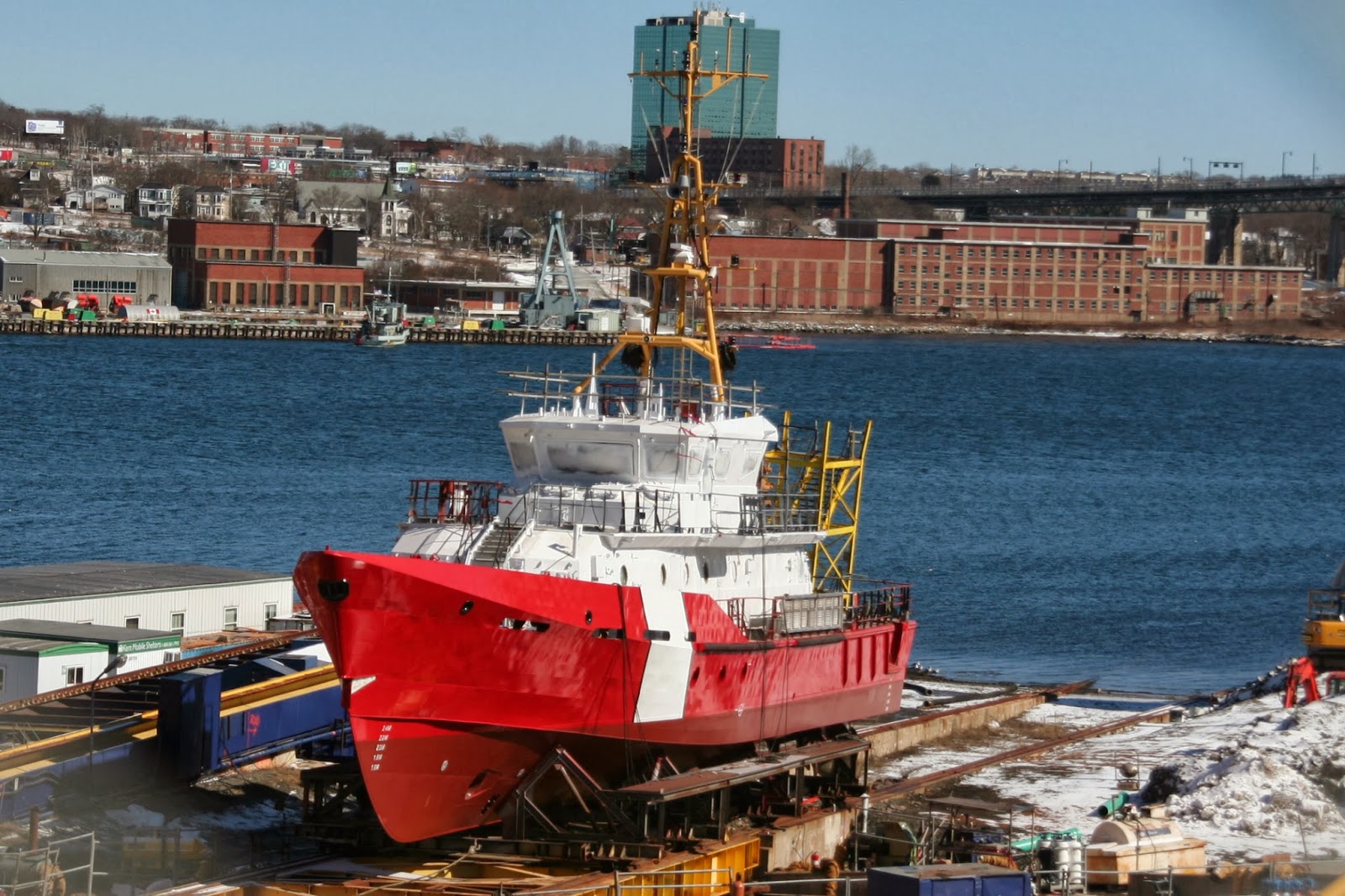The Government of Canada issued a rfp for the transport of the final two Hero Class Mid-Shore Patrol Vessels aboard a larger vessel with heavy-lift capability. This one-way transport voyage, is expected to commence in October 2014 from Halifax, Nova Scotia, arriving at an international port, closest to Victoria, British Columbia. This last requirement is oddly written as it seems to imply that Victoria need not be the final Destination.
The Mid-Shore Patrol Vessels (MSPVs) were built to replace aging CCG vessels patrolling Canadian waters on both coasts and in the Great Lakes. The last two MSPVs in the series of nine, to be built under Contract for CCG by Irving Shipbuilding, will be based in Victoria. The Contract with the Ship-builder does not provide transport for any of the nine Mid-Shore Patrol Vessels to their eventual destinations.
CCGS A. LeBlanc and CCGS Caporal Kaeble V.C. are based in Quebec, PQ; CCGS Private Robertson V.C., CCGS Corporal Teather C.V. and CCGS Constable Carrière are based in Burlington, Ontario; CCGS G. Peddle and CCGS Corporal McLaren M.M.V. are based in Halifax, and CCGS M. Charles and CCGS Captain Goddard M.S.M. will be based in Victoria BC, and are the vessels subject to this RFP. Previous vessels sailed to their home ports.
 Heavy-lift transport of the two MSPVs was only one of the options investigated; others such as sailing the ships on their own hulls were researched to determine what option was the most cost-effective; Sailing the MSPVs on their own hulls would seem to be cheapest method of transporting, but these small vessels are only allowed to travel up to 120 nautical miles off the coastline and MSPVs only have a maximum range of 2000 nautical miles. By following the shape of the coast closely and entering a number of harbours to re-fuel along the coast, this strategy can add up to 800 Nautical Miles to the length of the voyage and more voyage costs than a larger vessel would incur, such as harbour fees, pilotage fees, fuelling and provisioning costs. The time taken to sail this additional mileage will increase the delivery time to the final destination. Larger, heavy-lift commercial vessels do not have the same voyage restrictions off the coast as MSPVs; therefore they can use more direct, shorter routes and make less port visits, which cuts the time and costs needed to deliver both MSPVs to CCG – Pacific Region.
Heavy-lift transport of the two MSPVs was only one of the options investigated; others such as sailing the ships on their own hulls were researched to determine what option was the most cost-effective; Sailing the MSPVs on their own hulls would seem to be cheapest method of transporting, but these small vessels are only allowed to travel up to 120 nautical miles off the coastline and MSPVs only have a maximum range of 2000 nautical miles. By following the shape of the coast closely and entering a number of harbours to re-fuel along the coast, this strategy can add up to 800 Nautical Miles to the length of the voyage and more voyage costs than a larger vessel would incur, such as harbour fees, pilotage fees, fuelling and provisioning costs. The time taken to sail this additional mileage will increase the delivery time to the final destination. Larger, heavy-lift commercial vessels do not have the same voyage restrictions off the coast as MSPVs; therefore they can use more direct, shorter routes and make less port visits, which cuts the time and costs needed to deliver both MSPVs to CCG – Pacific Region.
This last section, Taken directly from the RFP clarifies the point, and blatantly offers advice on working around Canadian Cabotage laws (Cabotage laws basically state that cargo moved between Canadian ports must be done via Canadian Flagged and crewed vessel.)
Since there are few, if any, Canadian heavy-lift vessels capable of performing this transport, most likely an international shipper will be using a foreign-flagged vessel to complete this Contract work. Shipping cargo from a Canadian departure point, aboard a foreign heavy-lift vessel means that there are Canadian Cabotage Law considerations and potential tariffs at the destination; To avoid punitive tariffs most shippers would recommend the use of the closest U.S. sea-port to Victoria, B.C., such as Seattle, Washington, to be their destination.
the Full set of requirements can be found at https://buyandsell.gc.ca/procurement-data/tender-notice/PW-14-00624110.
In 2011, 3 CCGS Lifeboats were delivered by Beulga Favourisation to BIO. These vessels were built by Victoria Shipyard Ltd, and were ultimately bound for Quebec. As I see no Coasting Trade application, the lifeboats were likely sailed to Seattle WA to be loaded.

